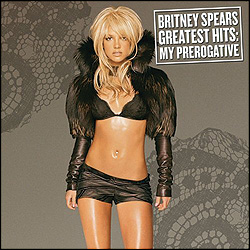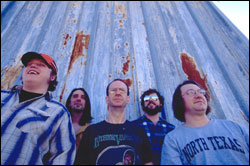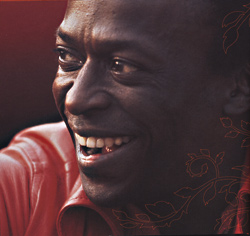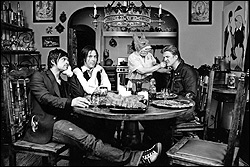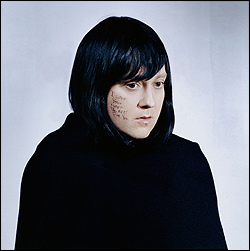BRITNEY SPEARS
Greatest Hits: My Prerogative
(Jive, $18.98)
SHANIA TWAIN
Greatest Hits
(Mercury Nashville, $13.98)
Britney Spears is neither particularly bright nor notably talented—which makes her different from most young American men or women exactly how? Still, her role as lightning rod for free-floating blondephobia earns her the tirade of the Bobby Brown song that subtitles her new Greatest Hits: My Prerogative. And though she’ll never be her own woman in the studio (hell, from the looks of the airbrushed-beyond-recognition cover, she isn’t even her own woman on her own best-of collection), from ” . . . Baby One More Time” to “Toxic,” she’s the ideal vehicle to chirp the seduction of the S&M rough-and-tumble that lurks beneath red-blooded American romantic lust.
By contrast, Shania Twain’s sensuality is mild—she is Canadian—and less orgasmic than evocative of the feel 320-thread-count sheets have against bare skin. If Britney’s best-of feigns career growth, even as the voice hyperventilating at its center barely changes, Shania’s new Greatest Hits is a picture of eternal maturity—frozen forever at her sexual peak, she teeters on the verge of aging, adult yet vivacious, grounded in cannier tracks than hubby Mutt Lange ever forged for Def Leppard.
MISSISSIPPI SHEIKS
Honey Babe Let the Deal Go Down: The Best of Mississippi Sheiks
(Columbia/Legacy, $11.98)
JOHN MELLENCAMP
Words & Music: John Mellencamp’s Greatest Hits
(Universal, $19.98)
The Depression’s premier folk-blues string band was too busy trying to sell records to worry about expressing itself. So naturally, as the paradox of pop will have it, the Mississippi Sheiks said plenty. The 20 cuts on Honey Babe Let the Deal Go Down, recorded in 1930–31, work a limited melodic ground. But what’s more striking is the curious consistency of tone—the lusty party tune “Bed Spring Poker” is weirdly calm, the heartbroken “Sittin’ on Top of the World” weirdly content.
John Mellencamp grew more entertaining the more he expressed himself, on account of his basic message: If the working class can’t get a fair shake economically, they at least deserve Kenny Aronoff’s drums. Too bad that Words & Music‘s jumbled chronology conceals his music’s evolution from arena bluster through fiddle-hooked midperiod to wearied bare-bones rock—and that Mellencamp squandered the perfect title, The Best That I Could Do, on his skimpy 1997 single-disc compilation.
GUNS N’ ROSES
Greatest Hits
(Geffen, $13.98)
MACY GRAY
The Very Best of Macy Gray
(Epic, $18.98)
The Compilation Axl Could Not Kill unforgivably fails to capture just how transcendentally irritating GN’R are at full length. Plucked from the flamethrower blare of Appetite for Destruction, “Welcome to the Jungle” sounds catchy yet trifling, while “Sweet Child o’ Mine” portends of “November Rain” to come. The fact that the band’s cover selections prove them less comfortable with Peter Laughner and Dylan and the Stones than with the Skyliners and McCartney isn’t as much a revelation as the fact that they really didn’t have too many hits to begin with.
Stridency comes naturally to Axl and Slash, but it was not for nothing that Macy Gray’s first hit was called “I Try.” She’s as much about effort as she is result, and if that means she feels the need to dereconstruct “Walk This Way,” it also means she takes chances like the viciously devoted “I’ve Committed Murder,” with Mos Def as her baffled mate. As that duet and the Fatboy Slim track “Demons” prove, Gray works well with others. Maybe she should guest on Chinese Democracy.
VARIOUS ARTISTS
Black Power: Music of a Revolution
(Shout! Factory, $19.98)
WU-TANG CLAN
Legend of the Wu-Tang: Wu-Tang Clan’s Greatest Hits
(BMG, $18.98)
With its connotations of universalist Civil Rights era uplift, ’60s soul has a safe place in history. But once black folk stopped reaching across the aisle, matters got murkier, in art as in politics, as the two-disc Black Power demonstrates. If its live version of “Movin’ on Up” with Curtis Mayfield calling out “Uncle Toms” and the snippet of H. Rap Brown designating violence “as American as cherry pie” remain rousing, George Clinton’s promise to “Chocolate City”—”You don’t need the bullet if you got the ballot”— is sadly not prophetic in too many ways to count, and McFadden & Whitehead’s closing “Ain’t No Stopping Us Now” rang ironic even before John Whitehead was slain in a drive-by this summer.
Twenty years down the line, with Public Enemy’s rehashed Afro-nationalism passé, Wu-Tang’s premillennial Black Power 2.0 didn’t imagine saving the ghetto or even escaping it, but rather hiding in the depths of its belly, protected by panoramically disorienting beats and a cryptic lyrical style shared by all its members. Legend of the Wu-Tang tells the familiar story of dissolution, as a collection of disparate, idiosyncratic voices prove themselves incompatible. On the early tracks, their voices intertwine like pre-swing jazz; by the time of “Triumph,” from 1997’s Wu-Tang Forever (separated from 1993’s Enter the Wu-Tang: 36 Chambers by a plethora of solo albums), they’re neatly taking turns at the mike, a line of solo artists speaking their piece. Individuality sucks. RIP, ODB.
MEKONS
Heaven & Hell: The Very Best of the Mekons
(Cooking Vinyl, $16.98)
NOFX
The Greatest Songs Ever Written by Us
(Epitaph, $13.98)
“Magic, fear, and superstition,” Tom Greenlaigh moaned joyously in 1991, “this is the curse of the Mekons.” And for more than a decade prior and more than a decade since, this drunken anarcho-insurgent-folk-punk collective has secured its place as a leftist punch line that owes its resilience more to the power of misprized myth and the forgotten ghosts of culture than a grounding in dialectical materialism. Heaven & Hell collects two nonchronologically sequenced hours from every phase of their career, and it all hangs together, which is more than you can say for most groups of leftist ideologues.
Though too fond of a good joke to obfuscate their Chomsky readings à la Bad Religion, NOFX are just as frustrated by the irrationality of their fellow human animals. Anyone who found fuckthesouth.com cathartic needs to hear Fat Mike rail against “a nation of God-fearing nationalists/Who think it is their duty to populate the homeland” on “The Idiots Are Taking Over.” But anyone ready to move beyond catharsis needs to hear the Mekons’ response to 9/11, “The Olde Trip to Jerusalem,” which excavates the socialist past of radical Protestantism.
Trying to Break Your Heart, Page by Page
2004 is the year that Chicago rock band Wilco became a publishing cottage industry. First was Wilco majordomo Jeff Tweedy’s Adult Head (Zoo Press, $14.95), a slim volume of poetry; next came Chicago Tribune rock critic Greg Kot’s Wilco: Learning How to Die (Broadway, $14), a bio. Now, Picturebox issues The Wilco Book ($29.95), a sumptuously packaged book-plus-CD combo deal. It’s not a bio or a fan book: Block quotes and copious typos are out, overexposed photographs and cryptic graphs are in. Sound bites from the ever- expanding membership of Wilco reveal the band to be a hyperarticulate collective of equals, rather than Tweedy’s minions, and essays by Henry Miller (!) and fellow logorrhea sufferer/National Book Award lightning rod Rick Moody provide further high-art cachet.
The real key here is the 40-minute CD that accompanies the book—12 tracks of improvisations, outtakes, and abstractions. At first the disc seems like filler—”Hummingbird” is the only vaguely recognizable track. But as you listen, thumbing through the diagrams and drawings of Glenn Kotche’s various percussion instruments, things suddenly become a bit clearer. Like Wilco themselves, this book takes disparate strands of information—white noise on paper—and transforms them, filtering the static through their collective imagination and the reader’s perspective to form a strangely cohesive whole, what keyboardist Mikael Jorgensen calls “the perfect blend of fancy and broken.”
Donna Brown
